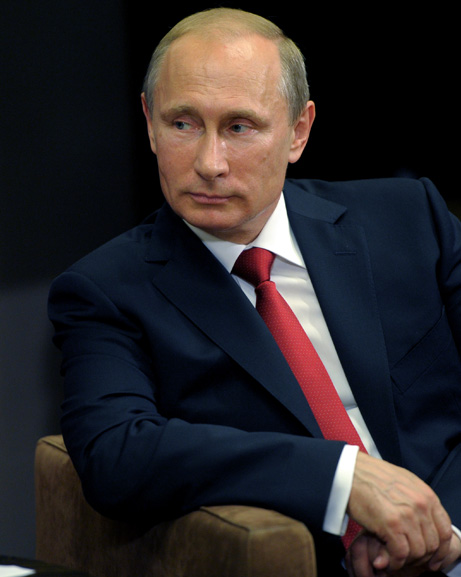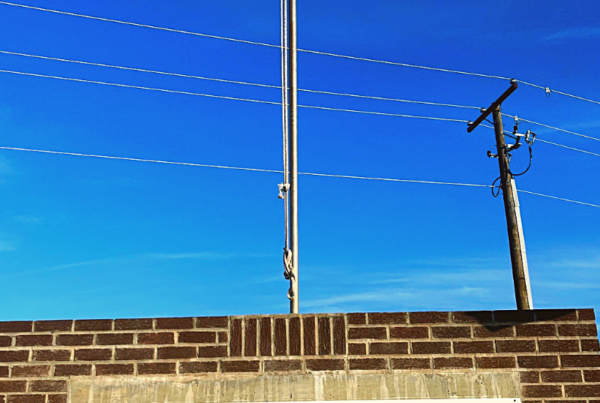On the edges of the Ukrainian capital Kyiv, small children emerge from the woods in a country at war chirpily singing a strange song: it is about Russian President Vladimir Putin, the man who orchestrated the brutal invasion of their nation in the twilight of winter, hanging himself.
I ask the father, Oleg, a devoutly Christian man, and well-known Ukrainian painter, where such a song came from, and he responds with a nonchalant shrug.
“I don’t know, but they all sing it,” Oleg says, undisturbed. “That’s the only way to end this war, for Putin to go. If we woke up and heard he was dead, we would be happy. The children understand this.”
Indeed, it is a sentiment largely felt across the conflict-riddled Ukraine, as its neighbor continues to bomb indiscriminately and purport to seize significant chunks of land. However, there is little doubt that the Russian offensive has gone according to Putin’s plans.
“They were told it would be just a few days, two weeks at most,” Andrii Malakhov, a former Ukrainian Special Forces soldier turned volunteer fighter, tells me, referring to the confessions of several captured Russian soldiers in the early days of the onslaught. “Putin thought Ukraine would just crumble, and that would be it.”

One well-connected source to the Kremlin confides that around 95 percent of the Russian troops deployed to Ukraine in the initial phase were either draftees or part of the police force – emphasizing that a principal portion were police, meaning that they had next to no large-scale weapons or combat training.
Despite the continuing failures, the carnage of conflict continues. Many analysts conclude that the only way out in the near term, aside from Kyiv making steep concessions such as formally agreeing not to join NATO or handing over the “independent” regions in the east, is Putin leaving his post.
So how could Putin fall?
One can contend that the revolution against the Russian leader – once a beacon of popularity who has sustained his grip on power since 1999 – appears more likely now than ever before. Putin has plunged his country into economic depravity and ostracism on the world stage because of the war, exposing the fallibility and weakness of its forces, despite once deemed as the second-most potent force on the planet.
While the odds of him being toppled from power still look exceptionally slim, modern history suggests the only way this takes place is via a popular uprising led by civilians or a military coup initiated by the Armed Forces. However, Putin has carefully ensured through his tenure that both the people and the military are far from threatening – from stringent press censorship to the slaying and silencing of contrarians, to government dependency on basic needs and the vehement shutting down of protests the split second they spring up.
Nevertheless, cracks are emerging.
Several Kremlin-linked sources noted that Putin was on the tipping point of deploying the much-feared tactical nuclear weapons in mid-April – even contemplating a strike on Krakow, Poland, some 500 miles from the Ukrainian border.
“Putin considers the use of tactical weapons the most forceful form of dialogue for him because a tactical delivery does not trigger MAD (the policy with the U.S. of mutually assured destruction) and no longer gives a shit about world opinion,” one source points out. “It took three days to talk him down and brought about more concern and opposition from those around him. Things have shifted a lot. The Kremlin is not holistic. There are split factions. Some are pro this war, and others are very much against it.”
Furthermore, sources surmise that relations with Beijing are not as cozy as they seem on the surface. Moscow insiders indicate that Beijing essentially “blessed” the war during Putin’s visit weeks earlier under the condition that the goal was not to attack nor seize the capital or significant parts of the country but to take the two eastern republics of Donetsk and Luhansk and consequently thrust into an uncomfortable and unforeseen geopolitical quagmire.
Further, there is a growing belief in the Kremlin that once the kinetic conflict in Ukraine ends, the West would be a far more lucrative partner than Beijing. However, this concept is unlikely to be popular with the public so long as Putin remains in power.
Some have also hinted that China may have hinged on a Russian defeat all along, eventually forcing a pariah and depleted Moscow to return Siberian land to Beijing. After all, Russia has seized more Chinese land than any other country, a notion that the Communist Party despises.
China once claimed the vast, resource-rich Asian part of Russia to the east of the Ural Mountains on the Sino-Russian border. Yet Russia overpowered the immense parcel of land through the Amur Annexation of 1958. The region endured some military clashes between the USSR and the People’s Republic of China in 1969, amid the height of the Cold War.
In the time since, despite investing billions of dollars in the region, Russia has failed to develop it due to the harsh winters and unforgiving terrain, unable to take advantage of the untapped timber, natural gas, oil and highly sought-after minerals like copper, gold, diamonds, and mercury.
According to one well-placed Russian insider, the divide between Russia’s Foreign Intelligence Service and Putin was emerging for months before the war kicked off. However, the Presidential Palace have angrily dismissed those grumblings.
The Kremlin has been relatively successful in suppressing large-scale anti-war demonstrations once they crop up, but the top leadership tier remains uncertain how to deal with the increasing risk of an overthrow.
In late March, Kyiv disseminated alleged intelligence that “influential people” inside Kremlin circles – eager to revive financial links to the West – were weighing up ways to push or potentially assassinate the sitting President. Moscow immediately repelled the claims, along with Washington intel assertions that Putin had been misinformed about his military’s struggles in the war theater.
“There are high-ranking folks inside the Kremlin that can and want to do this. But it is a hard game. First, the public opinion of Russia from the outside world needs to be changed. It needs to be seen that Russia can re-enter the world. But Putin won’t step down on his own, and he can’t be taken out forcefully or through a full-blown coup,” the well-placed source continues. “That will lead to a civil war.”
A possible solution?
“It isn’t going to work if he is arrested and taken to the Hague to be trialed for war crimes. So, it’s got to be a soft coup that doesn’t look like a coup, a smooth transfer of power done through resignation,” the insider asserts.
Nevertheless, it still seems a stark long shot. Russia is highly coup-proof, and the President remains far removed from almost all the population and even the most highly trusted and vetted security personnel.
Then there is the issue of the leader’s physical and mental health, which has been subject to a bevy of unverified theories since the Russian military build-up on Ukraine’s borders gained momentum early this year. Speculation has persisted that Putin had a psychotic break during the Covid-19 pandemic and is potentially suffering from Parkinson’s Disease or another severe illness.
Several sources within the U.S. intelligence community tell me that “it was known” the Russian leader had some form of cancer, although details and severity are still subject to debate.
And he may have more reason to live than ever before.
“Putin did have pancreatic cancer a little while back, and the word was he was treated quietly in an allied Middle East country. He is recovered now and wants to spend a lot of time with his kids, two young boys with his new love,” the source adds, although this information cannot be independently confirmed. “For the first time in his life, Putin is dedicated to his family and will do anything possible to make sure things don’t get worse for his family.”






